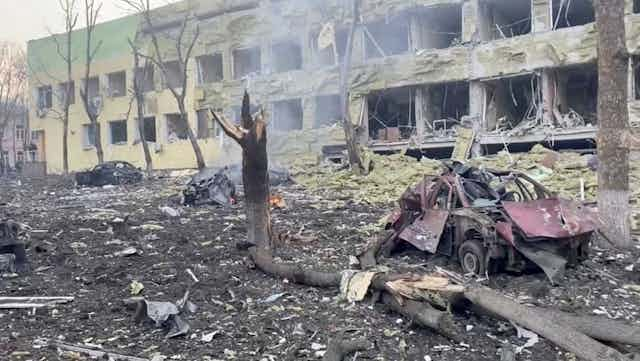Over recent years, Russia has often boasted about the capabilities of its precision-guided missiles (PGMs). Two years ago the Defence Ministry released a video of its Tornado-S precision missile which, it said, can strike targets to within one metre. Given that such precise munitions also provide the ability to avoid striking clinics and hospitals in Ukraine, the question is surely: why have these healthcare facilities been hit?
I have seen these PGMs at work. A few years ago, while researching a book, I was allowed to watch real-time, air-launched Hellfire missile strikes against Islamic State jihadists. I saw a missile hit a moving motorbike in Syria from another continent – something scarcely believable to witness.
In Ukraine, meanwhile, the World Health Organization (WHO) had identified 82 Russian military attacks on Ukrainian healthcare facilities by April 4. Dr Jarno Habicht, WHO representative in Ukraine, had previously described such attacks on healthcare as “a violation of international humanitarian law”, which destroyed both critical infrastructure and hope. Habicht added: “They deprive already vulnerable people of care that is often the difference between life and death. Health care is not – and should never be – a target.”
The UN high commissioner for human rights, Michelle Bachelet, has also accused Russia of “indiscriminate attacks” which “may amount to war crimes”. International humanitarian law clearly states that during armed conflict, civilian hospitals may not be attacked under any circumstances. They should also be respected and protected at all times by all parties.
Russia’s own military regulations acknowledge these protections. In addition, they oblige Russian officers to set an example by ensuring international humanitarian law is observed and ensuring subordinates understand their legal obligations. They are further required to repress violations of IHL by subordinates, calling offenders to account and reporting them.
That’s the theory. But in practice, given that the WHO analysis has verified such a large number of attacks on Ukrainian healthcare facilities, they have regularly committed war crimes under international law.
So why is the Russian military not using precision munitions to avoid hitting hospitals? The answer depends on understanding what PGMs are for and how they fit into Russia’s military approach.
PGMs include missiles launched from aircraft and from ships as well as multiple ground-launched rockets and guided bombs. There were three main reasons for developing PGMs: hitting critical targets, reducing the number of combat sorties and munitions required, and limiting collateral damage to civilian structures and civilians.
An example from the Vietnam War shows why political and military leaders want PGMs. Between 1965 and 1972 the US conducted 869 bombing raids against the Thanh Hoa Bridge in North Vietnam. All 869 attacks failed and 11 aircraft were shot down in the process. When a new laser-guided bomb was used in May 1972, the bridge was destroyed at the first attempt.
Avoiding civilian casualties
Since 9/11, during the US War on Terror civilian deaths reduced public support in a way that military casualties or mission failure did not. Firing PGMs from military drones became a way of protecting civilians – or at least reducing civilian deaths. But for political more than ethical or legal reasons.
Maintaining public support for military action, by avoiding civilian casualties, is important in democracies. Every few years, a dissatisfied populace can vote politicians out of office.
In Russia’s attack on Ukraine, Putin’s priorities are different. Military casualties are deeply unpopular, especially with the Committee of Soldiers’ Mothers of Russia. Mission failure is unthinkable, while civilian casualties appear to be of little concern. And, in any case, the idea that Russian forces have committed atrocities against civilians has been denied outright by the country’s foreign minister Sergey Lavrov.
Senior Russian officer, Colonel-General Mikhail Mizintsev, has been added to the UK’s sanctions list after it was reported he had ordered the bombing of a maternity hospital and theatre in Mariupol. More than 1,000 civilians were sheltering there and 300 are reported to have been killed. Mizintsev also allegedly orchestrated Moscow’s bombing campaign in Syria which included regular attacks on hospitals.

Attacks on health centres heighten fear among target populations, prompting many to flee. In 2016, Russia was accused of “weaponising refugees” from Syria for geopolitical gain. Russia’s destruction of hospitals in Ukraine echoes that approach. Now, Russia’s armed forces show no sign of using the accuracy of PGMs to avoid striking Ukrainian hospitals. And no attempt to conform to international humanitarian law.
On February 24, Putin authorised what he termed a “special military operation” against Ukraine. He also made it illegal for Russians to refer to this military operation as “war” or an “invasion”. Avoiding these terms looks like an attempt to avoid the obligations of international humanitarian law to protect hospitals and civilians which apply under the Geneva Convention in “all cases of declared war or of any other armed conflict”. But, even if Putin wanted to use PGMs near hospitals, the US secretary of defense, Lloyd Austin, has suggested Russia is “running low” on precision missiles.
Warnings from history
Russia’s attacks on Ukrainian hospitals appear consistent with the brutal bombing approach suggested a century ago by Italian military theorist Giulio Douhet. “Merciless pounding from the air”, he wrote, would cause a breakdown of social structure, shatter the morale of civilians, and break their will to keep resisting.
But Germany’s bombing of London in the first world war, the Allied strategic bombing of Germany in the second world war and US bombing in the Vietnam War all suggest otherwise. Bombed civilian populations have been resilient and determined to persevere.
Even without precision missiles, it would be possible for Russia to avoid striking Ukrainian medical centres – but only if the political and military will existed. It appears that no such will exists. Instead, the evidence suggests Russia is using conventional bombing to hit civilian hospitals, then using disinformation to deny such actions.

